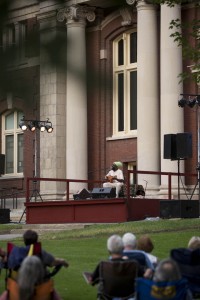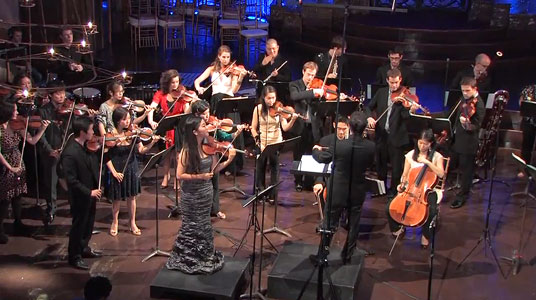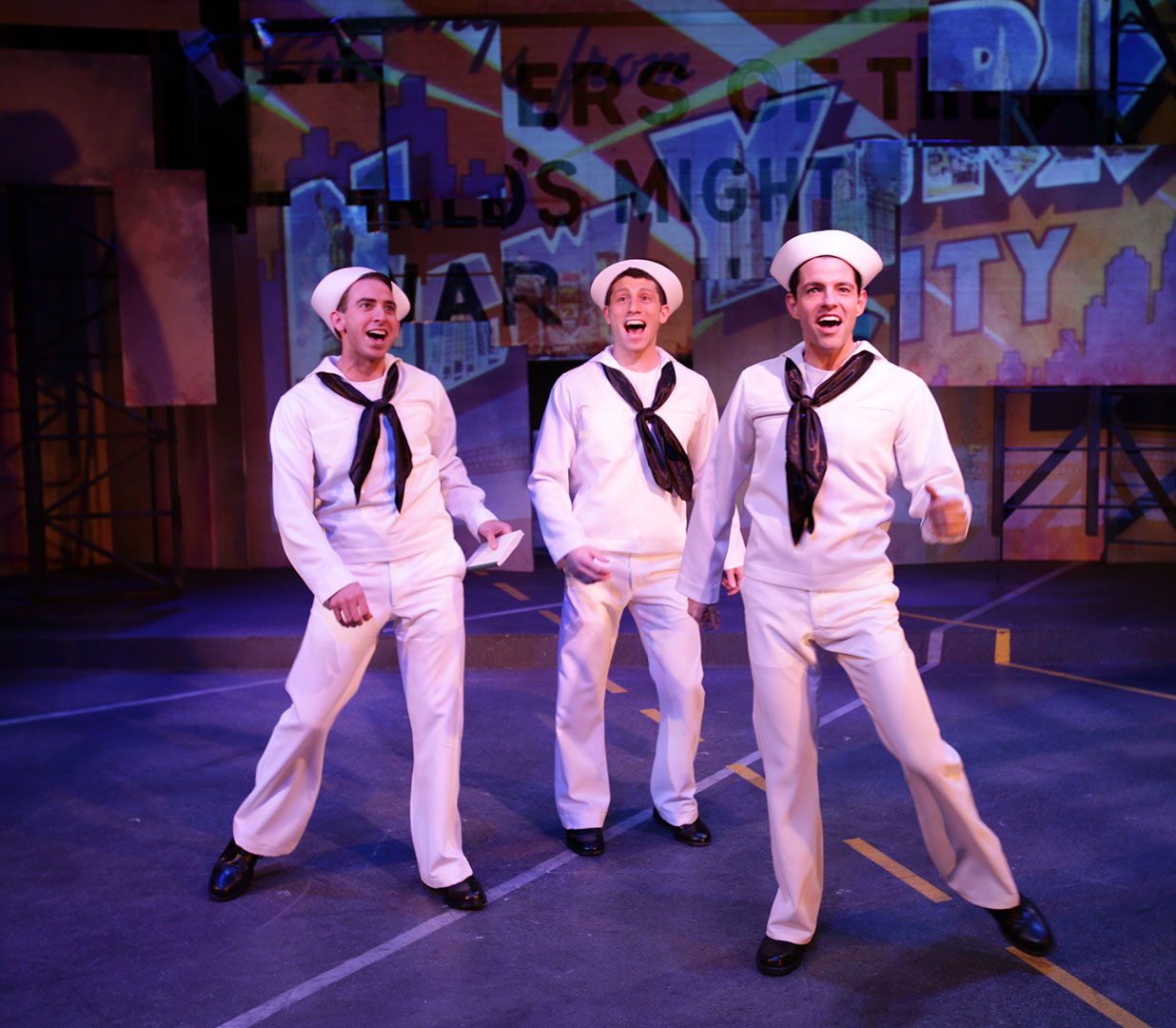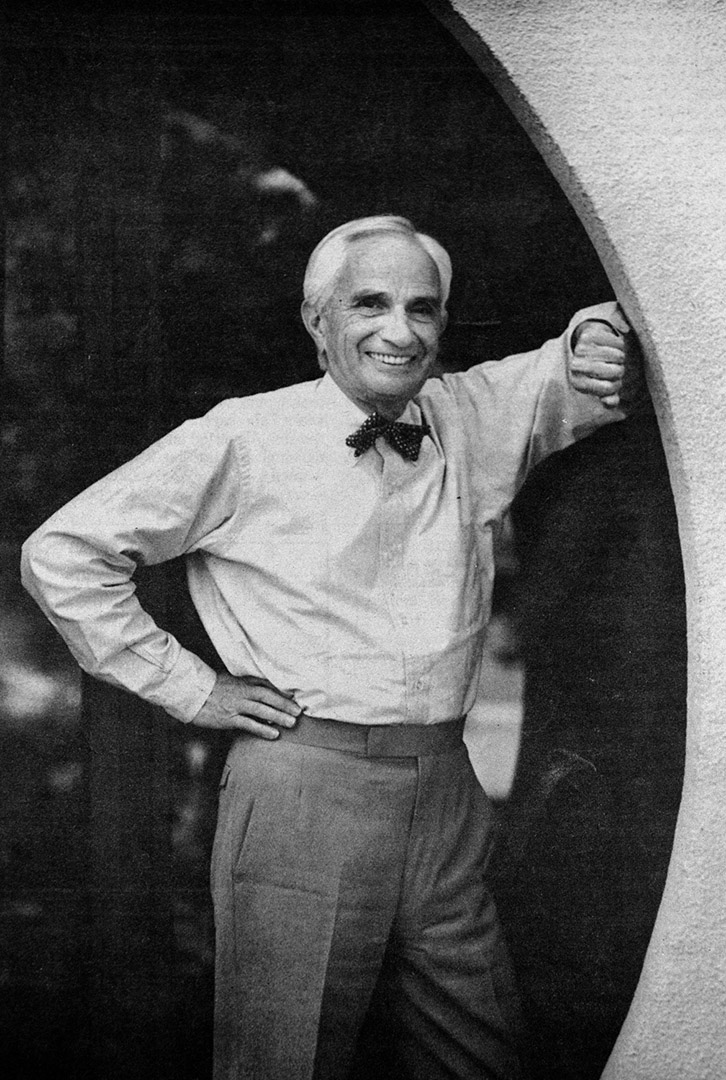
Felt like coming home as Corey Harris ’91 offers blues gold on the Quad
Blues in the night is no fun. But blues in the evening can be a very good time indeed, as proven July 18 by musician Corey Harris ’91.
Harris visited Bates to kick off the college’s brand-new Concerts on the Quad summer music series, dedicated to the blues in all its myriad forms.
The setting was the front porch of Coram Library, where the public presentations usually involve academic regalia, sunshine and some degree of heat.
Spotlighted by the last rays of the setting sun, Harris skipped the cap and gown but generated plenty of musical heat with an 80-minute set given largely to country blues.
Bates President Clayton Spencer introduced Harris. A casual Spencer, obviously pleased to be presenting the musician, had some fun with her introduction. Describing Harris as “a brilliant musician and Bates alumnus,” she added, “I love having those two things in the same sentence.”
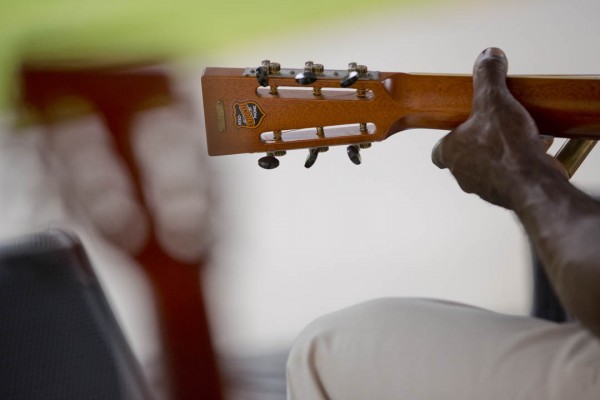
What makes the country blues aesthetic so cool, writes Doug Hubley, “is how big, complex and captivating a sound one player can wring from one guitar.” Phyllis Graber Jensen/Bates College.
She also offered a helpful amendment to his career bio, indicating that the “old Quad” should be added to his impressive list of career venues. Speaking of which, Harris came to Bates fresh from a short Maine tour that brought him to the highly regarded Stone Mountain Arts Center, Brownfield, and Rockland’s North Atlantic Blues Festival.
As Harris recently told a Portland Press Herald reporter, “I think roots music is a good name for what I do, because I play the whole tree, you know?” His Bates show did reflect his wide interests within music of the African diaspora, sparkling with sounds of the Caribbean, West Africa and Memphis R&B.
But blues, and really the acoustic country blues of the Deep South, was the heart of the show — perhaps necessarily, since additional musicians are often integral to Harris’ ventures into other genres. In fact, the country blues aesthetic rests in part on the notion of solo performance: What makes it so cool is how big, complex and captivating a sound one player can wring from one guitar.
Crackling energy and fresh invention into the old Delta playbook.
Harris showed complete command in that realm. Switching between fretted acoustic guitar and a wooden resonator instrument played with a slide, he dazzled his audience with moves that infused crackling energy and fresh invention into the old Delta playbook. Late in the show, he revealed different facets of his virtuosity with a few instrumentals that explored “prettier” precincts of the musical scale.
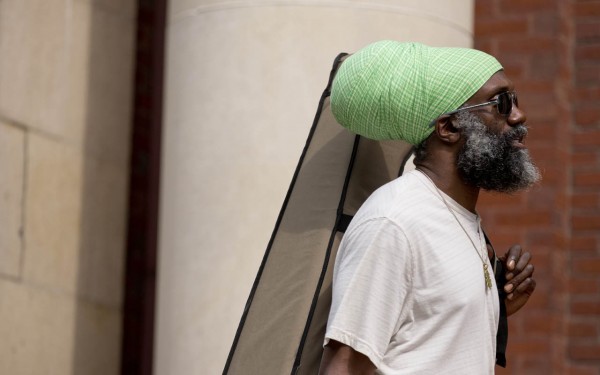
As Corey Harris recently told a Portland Press Herald reporter, “I think roots music is a good name for what I do, because I play the whole tree, you know?” Phyllis Graber Jensen/Bates College.
As a singer, Harris was equally fluent and rangy, moving easily from deep growl to plaintive wail and creating vocal personas to suit a shifting panoply of characters and points of view.
The singer drew heavily on his latest album, this year’s Fulton Blues, whose overall theme is the destruction of Fulton, a middle-class, historically black neighborhood that fell victim to “urban renewal” planning in the 1970s in Richmond, Va. Selections included the title number and “Lynch Blues,” which was especially compelling.
Blues is about laughing just to keep from crying, right?
But Harris ranged all over his catalog. He looked all the way back to his 1995 debut, Between Midnight and Day, for “Pony Blues” and “61 Highway,” and touched down in the 2000s for the spirituals “Daily Bread” and “Keep Your Lamp Trimmed and Burning.” There was humor, too (blues is about laughing just to keep from crying, right?), in songs like the rag “That Will Never Happen No More” and the classic double entendre “Diddy Wah Diddy,” which puts the blue in blues.
For this writer, there were two particular standouts in an overall strong performance: the reggae-flavored “Watching You,” a Harris composition about technology and surveillance that got even edgier with the recent news about National Security Agency activities; and an excellent cover of Skip James’ haunting “Devil Got My Woman.”
The Quad audience, numbering about 100, blended young families — “there’s my opening act,” Harris said as two little girls raced back and forth in front of him — and folks who’d been around for the great rediscovery of the blues in the 1960s and ’70s.
Bates staff and faculty were well-represented, among them members of the faculty in anthropology, Harris’ major.
Rain started to fall along with the night a little before 8 o’clock, and after a generous set that numbered nearly two dozen songs, Harris wrapped up the evening with a short and sweet “Pony Blues.”
Held at 6:30 p.m. Thursdays, Concerts on the Quad continue Aug. 1 with Portland artist Samuel James and conclude Aug. 15 with Bates favorite Francine Reed.
